What is an ABM Funnel? Features & Steps to Create One
Tired of targeting a vast pool of unqualified leads?
You might want to try an ABM funnel - a strategic approach to B2B marketing that prioritises quality over quantity.
Imagine a sales funnel flipped on its head, where you laser-focus on specific, high-value accounts with personalised campaigns.
Instead of casting a wide net, the ABM funnel meticulously targets your ICP, pinpointing B2B companies that perfectly align with your offerings and long-term goals.
In this article, we’ll explain how you can increase your chances of securing lucrative deals and establishing long-lasting partnerships with an account-based marketing funnel.
Let’s dive in 👇
What is an account-based marketing funnel?
An account-based marketing (ABM) funnel is the path an interested lead takes to becoming a paying customer. An ABM funnel targets a specific account and customer journey instead of casting a wide net like an ordinary sales funnel.
Think of it as a customer journey explicitly designed for your dream clients. You identify key accounts, map their unique decision-making process, and then orchestrate personalised touch points across every stage, from awareness to advocacy.
Unlike the broad-net approach of traditional marketing, ABM funnels deliver relevant content, messaging, and engagement experiences tailored to each account’s specific needs and pain points.
What does an ABM funnel look like?
Unlike its linear cousin, traditional B2B marketing, the ABM sales funnel resembles a dynamic loop, continuously nurturing relationships and adapting to account responses. It generally encompasses five key stages:
1. Identifying your target accounts
Sales and marketing unite as a team, scrutinising data and market insights to pinpoint high-value accounts that perfectly align with your ideal customer profile (ICP).
Together, examine your top clients with the highest customer lifetime value (CLV) and determine any common characteristics they share, such as company size, industry, or country.
This detailed analysis will help you uncover the key to unlocking your perfect customer and create a new ABM prospecting list that comes to life with enriched potential.
After identifying your target audience, conduct thorough research on their demographics, intent, and firmographic data in order to tailor your messaging effectively.
2. Research and understanding
Understanding your target list is crucial in creating an effective ABM funnel.
With your list in hand, it’s time to delve deeper and gather as much information as possible. Utilise tools such as firmographics, intent data, and industry reports to gain insight into their unique challenges, buying journeys, and key decision-makers.
👉 Firmographics can provide valuable demographic information about your target accounts, such as company size, industry, revenue, and location.
👉 Intent data can help you understand the specific topics or solutions your target accounts are actively researching or showing interest in.
👉 Industry reports can provide insights into trends, challenges, and opportunities within your target market.
By understanding your target accounts more deeply, you can effectively tailor your messaging and content to address their specific pain points and needs.
3. Engagement and activation
Engagement and activation are crucial stages in the account-based marketing (ABM) funnel. During this phase, it is essential to capture the interest of your target accounts and motivate them to take action.
To effectively engage and activate your prospects, you must create personalised and tailored messaging that resonates with their needs and challenges.
One way to do this is through account-based engagement strategies. By leveraging data insights and personalisation tools, you can create targeted messaging that speaks directly to your target accounts’ pain points and challenges.
This can include personalised website experiences, targeted social media ads, or insightful content offers delivered directly to their inboxes.
As engagement grows, shift your focus towards conversion and opportunity creation. Use account-based strategies such as personalised sales outreach, customised product demos, and targeted account-based advertising to nurture your prospects through the sales funnel.
Personalising your sales outreach and offering customised product demos can increase the likelihood of converting your prospects into opportunities.
Additionally, leverage targeted account-based advertising to reach your target accounts with relevant messaging and offers, further increasing the chances of converting them into customers.
4. Advocacy
Advocacy is where the focus shifts from acquiring new customers to nurturing and maintaining relationships with existing ones. At this stage, it is crucial to continue providing value and support to key stakeholders to turn them into advocates for your brand.
One way to nurture relationships with key stakeholders is by consistently communicating with them and showing your investment in their success. This could include providing ongoing support, sharing relevant industry insights, and celebrating their successes.
By turning your existing customers into advocates for your brand, you can benefit from positive word-of-mouth referrals, testimonials, and case studies that can help attract new customers.
Additionally, happy customers are more likely to renew their contracts, upgrade their services, and become loyal, long-term partners.
Remember, happy customers become your biggest asset.
5. Measurement and optimisation
No performance is complete without measuring its impact. Track key ABM metrics like website visits, engagement rates, and deal velocity to see if your strategy brings results.
By understanding the different tiers of accounts in your funnel and tailoring your approach to each, you can increase engagement, trust, and conversions.
A/B testing can help you achieve this by iterating and optimising your account-based marketing funnel to ensure it delivers maximum impact.
Remember, continuous improvement is the key to the success of your ABM execution.
💡You might also be interested in our ungated account based marketing template.
Characteristics of an ABM funnel
Unlike traditional marketing’s broad approach, the account-based marketing funnel meticulously personalises every touchpoint for specific, high-value accounts.
Key attributes
The ABM marketing funnel tailors everything for your dream clients, not generic audiences. Think personalised messages, data-driven decisions, and teamwork across sales, marketing, and customer success. It’s all about building valuable, long-term relationships, not just quick conversions.
Let’s quickly review the main characteristics of an ABM funnel:
- Hyper-personalisation: craft experiences that resonate with individual account needs and challenges.
- Data-driven decisions: leverage firmographic and intent data for precise targeting and effective messaging.
- Team collaboration: marketing, sales, and customer success unite to deliver a seamless journey.
- Quantifiable impact: track key metrics like website visits and deal velocity to demonstrate ABM’s value.
- Dynamic adaptation: evolve continuously based on feedback and market shifts to maximise engagement.
- Long-term focus: cultivate enduring partnerships through ongoing engagement and advocacy.
- Tech-powered approach: utilise ABM-specific tools for deeper insights and efficient execution.
Now, how is ABM different from traditional marketing? This table summarises the differences so you can understand the value of ABM at a glance👇
Stages of an ABM funnel and how to build one
Forget the one-size-fits-all marketing approach. ABM isn’t about shotgun blasts but about laser-focused precision, targeting high-value accounts with personalised experiences that drive revenue.
But where do you start?
How do you build an ABM funnel that converts like crazy?
Let’s break down the essential steps, equipping you with the knowledge and strategies to dominate B2B sales.
Before you begin:
- Align your team: secure executive buy-in and ensure marketing, sales, and customer success are on the same page.
- Build a foundation: lay the groundwork for “smarketing” - a collaborative effort where sales and marketing work together towards shared revenue goals.
- Test the waters: run a pilot program to confirm ABM works for your unique business.
Here are the six ABM funnel stages to follow when building yours 👇
1. Collaborative target list
Marketing and sales must work together to create a list of target accounts, focusing on those your sales team prioritises. Think of them as your ideal B2B customers. Enrich this list with industry data, customer insights, and social listening.
Segment strategically based on firmographics, behaviour, and intent to personalise outreach for each dream client. Remember, refine and update your list regularly to ensure you’re targeting the right accounts with the most effective campaigns. This collaborative, data-driven approach is key to attracting valuable partners and driving sustainable growth.
Sales intelligence tools like Cognism, ZoomInfo or Lusha can help you build and enrich your lead lists for full funnel ABM just like it did for DCSL GuideSmiths.
Cognism helped them adopt an effective ABM strategy, save time on prospecting and fill their pipeline with opportunities. Here’s what they said:
“We started mixing different activities, such as cold calling and emailing, rather than just running an email cadence. Within a couple of months, we started finding some really good opportunities and saw ROI.”
“The direct dial data was much better than anything we’ve seen elsewhere. We’ve used a few major data providers, and it has been a bit mixed. Cognism has just been way more accurate.”
“Cognism is unique. It’s not just a data company; it’s end-to-end. It gives you total control to take your own route. I’ve already had conversations where I recommend Cognism to people, and I think a few of them have gotten in touch.”
Click the banner👇to discuss your needs with a data expert.
2. Use the F.I.R.E. method
Don’t just rely on basic company information for account-based selling. Use the F.I.R.E. method to filter your list. Here’s what F.I.R.E. stands for:
- Fit (perfect match to your ideal customer profile)
- Intent (actively researching solutions like yours)
- Relationships (existing connections)
- Engagement (showing interest in your brand)
Beyond simply identifying high-value accounts, the F.I.R.E. method acts as a laser-focused filter to refine your collaborative target list even further.
Instead of just relying on basic company information, F.I.R.E. helps you zero in on accounts with the highest potential for success.
- Look for Fit: do they perfectly align with your ideal customer profile, sharing industry, size, and pain points?
- Then assess their Intent: are they actively researching solutions like yours, indicating buying readiness?
- Leverage existing Relationships: do you have any internal connections within the account that can open doors?
- Finally, gauge their Engagement: are they showing interest in your brand through website visits, social media interactions, or downloaded content?
By filtering your list through these crucial lenses, you ensure you’re not just targeting accounts that fit your profile but actively seeking accounts primed for conversion, maximising your campaign effectiveness and increasing the likelihood of attracting true dream clients.
3. Prioritise based on potential
Think of your target accounts as a spectrum of potential customers, each with varying degrees of readiness and value. By prioritising them strategically, you maximise your resources and focus on those with the highest chance of conversion and long-term partnership.
Tier 1: High-value partners
These are your golden tickets, perfectly aligning with your ideal customer profile and demonstrating clear buying intent. They actively research solutions, have the budget, and exhibit decision-making momentum.
Allocate your best resources to these accounts, crafting highly personalised campaigns and nurturing strong relationships with key decision-makers. This could involve dedicated account managers, tailored content addressing specific pain points, and invitations to exclusive events.
Tier 2: Promising prospects
These accounts show strong potential but might need some cultivation before they reach their full potential. They might be in the early stages of their buying journey, require more education about your solutions, or lack complete decision-making authority.
Tailor informative content and targeted outreach to educate them about your value proposition and build trust. Leverage ABM data and insights to personalise your approach, understanding their specific needs and interests. Don’t underestimate the importance of relationship building: connecting with key decision-makers early on can significantly influence their journey towards becoming loyal customers.
Tier 3: Future champions
While these accounts may not be immediate sales opportunities, they have the potential to become valuable partners in the future. They might be smaller companies, lack an immediate budget, or simply need more awareness about your brand.
Offer valuable content and consistent engagement through industry insights, regular email campaigns, and social media interactions. The goal is to nurture their interest and position yourself as a trusted advisor.
By demonstrating your expertise and understanding of their industry, you gradually move them closer to the coveted “promising prospect” tier and, ultimately, a potential high-value partnership.
Remember, this is not a static system. Regularly re-evaluate your segmentation based on new data, engagement levels, and buying signals. Accounts can move between tiers as their potential and interest evolve.
4. Deep dive and personalise
At this stage, collaborate with sales to understand each account’s ideal personas, preferred messaging, and the content that resonates with them. Leverage data and insights with account-based marketing software like Cognism and 6sense to gain a deeper understanding.
Here’s how this data helped SparkForce double its pipeline:
“Cognism saves us a lot of time and drives higher accuracy. It stops us from targeting irrelevant companies. The value it gives us is the data quality, more than quantity.”
“Our pipeline more than doubled in Q3 2024 year on year and nearly tripled since the start of this year.”
Don’t be afraid to dig deeper. Conduct thorough research on each buying committee member. Tailored content based on their individual needs can drastically improve your win rate.
5. Engage and convert
Use your insights to create personalised content, demos, and communication tailored to each priority account. Think targeted social media ads, relevant blog posts, and personalised email outreach that speaks directly to their challenges.
Be a problem-solving partner, not just a salesperson. Show you understand their specific challenges and offer solutions that demonstrate your value as their strategic partner.
Use these personalisation ideas in your upcoming ABM campaign:
6. Track, analyse, and optimise
Building trust and relationships takes time. Set up a robust measurement framework to track key metrics like website visits, engagement rates, deal velocity, and ROI for each stage of the funnel. This data is your fuel for continuous improvement.
Start by tracking account engagement data, such as response rates and engagement rates. This initial data helps you build trust, showcase ROI, and stay proactive in your outreach.
By following these steps and adapting them to your unique business, you can build an ABM funnel that attracts ideal customers, fosters lasting relationships, and drives sustainable B2B success. Remember, ABM is an ongoing journey, not a one-time destination.
💡Check out these account based marketing examples to inspire your next campaign!
The best ABM results start with great data
Moving leads through a successful ABM funnel means having actionable, accurate contact data.
Cognism has helped power many B2B companies’ ABM strategies with highly accurate email addresses and phone-verified mobile numbers. One happy customer, SparkForce, said:
“We’ve had a lot less churn this year than last year, and that has something to do with the overall quality and the refinement of our work. Cognism is part of that.”
“I would recommend Cognism to anyone trying to reach the right companies in their ICP. If you need to build a target account list, you need Cognism!”
Join them and other revenue superstars today. Click the banner below to book a call with a data expert 👇
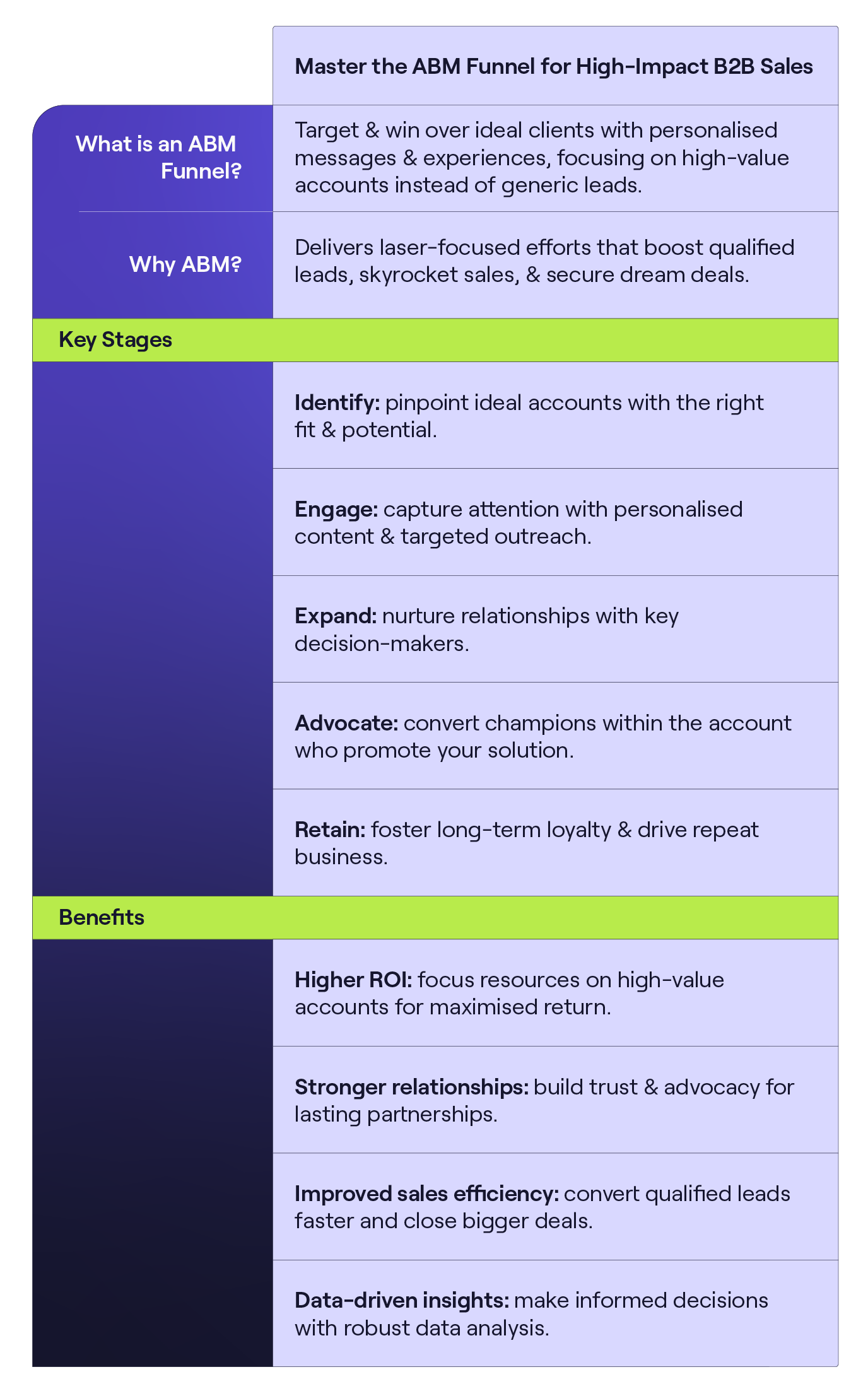
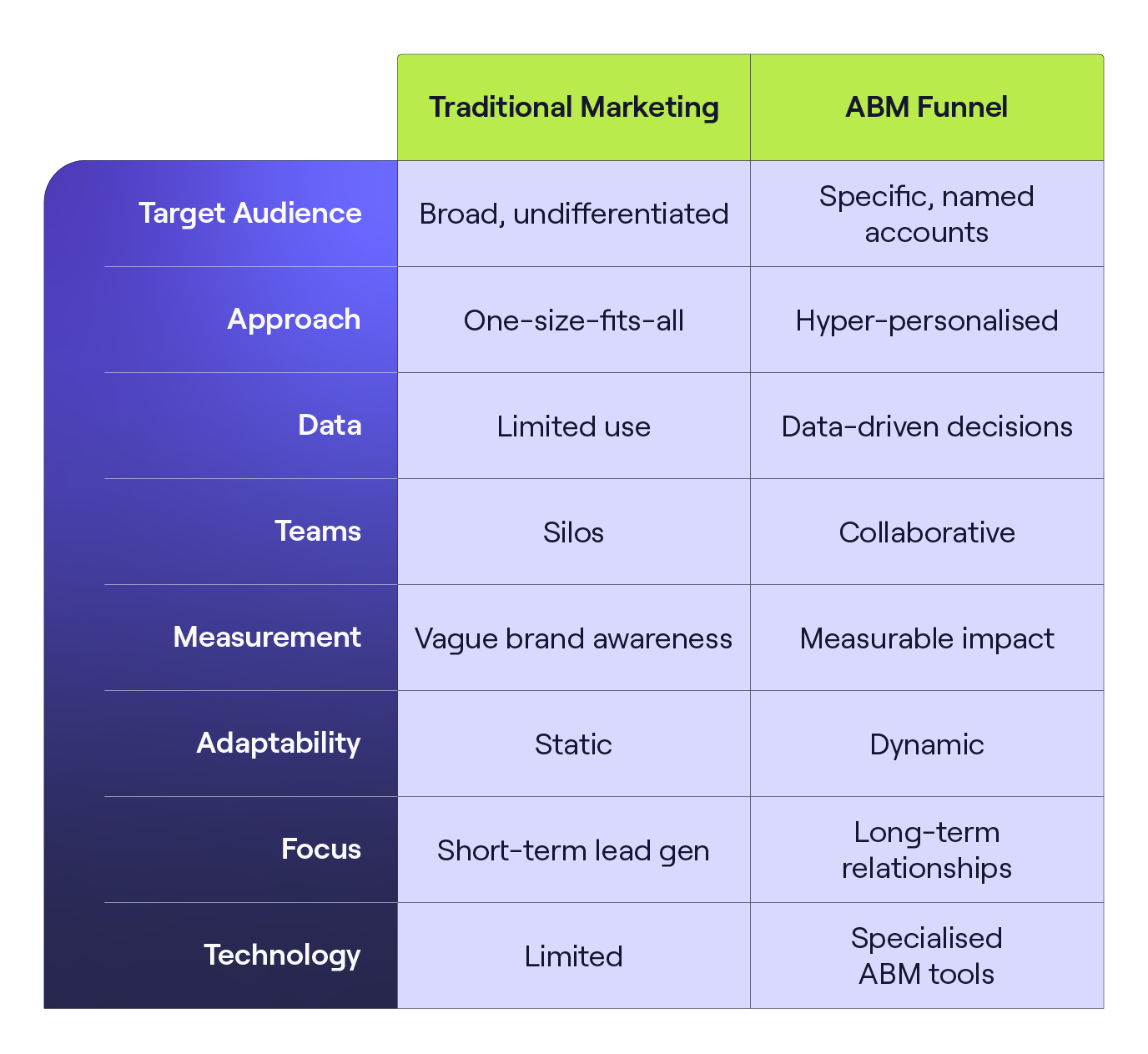
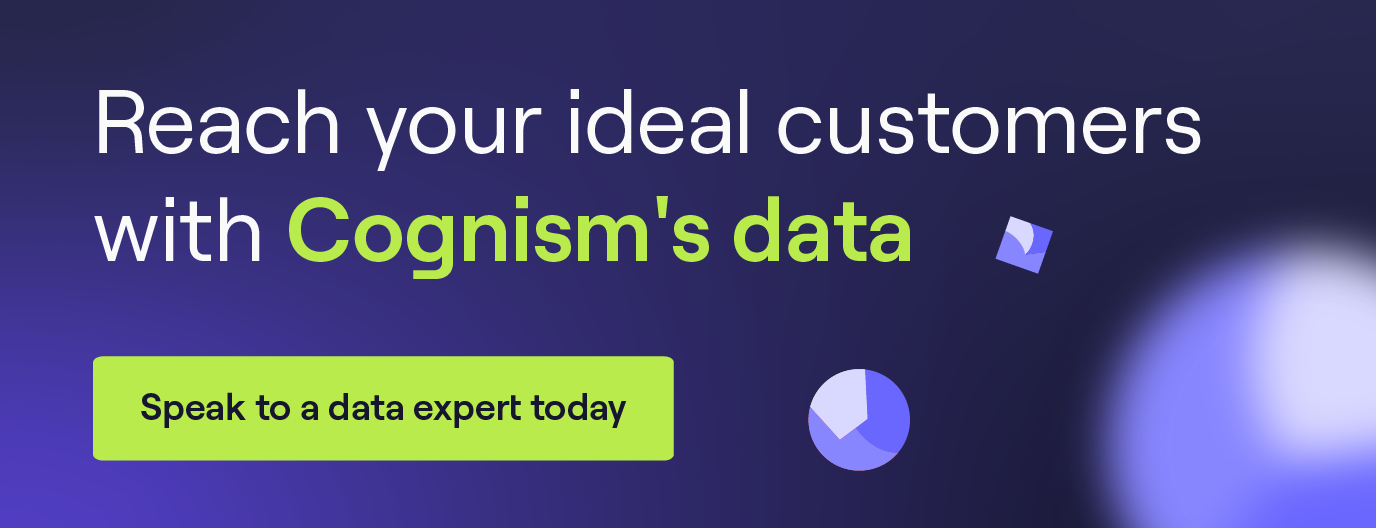
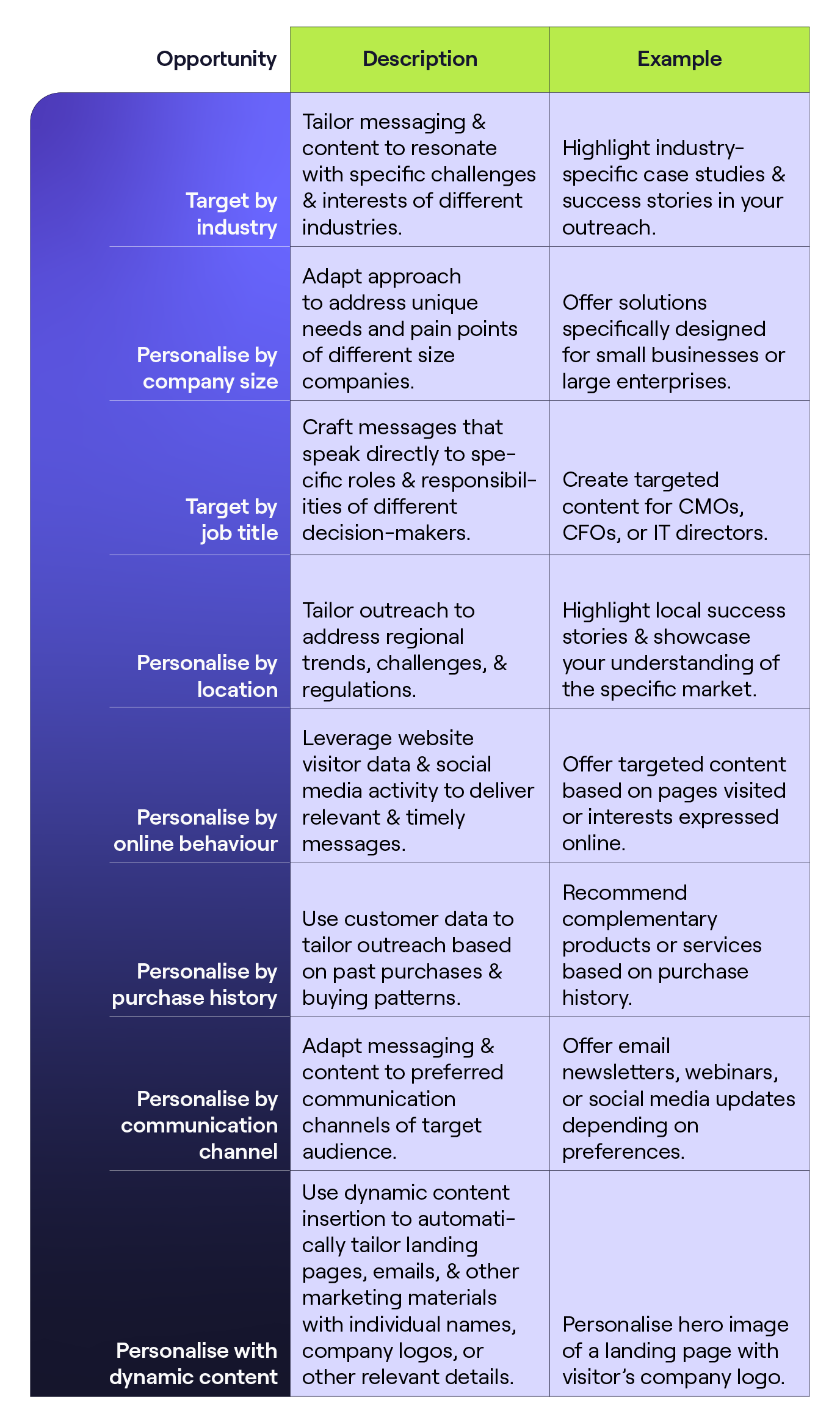
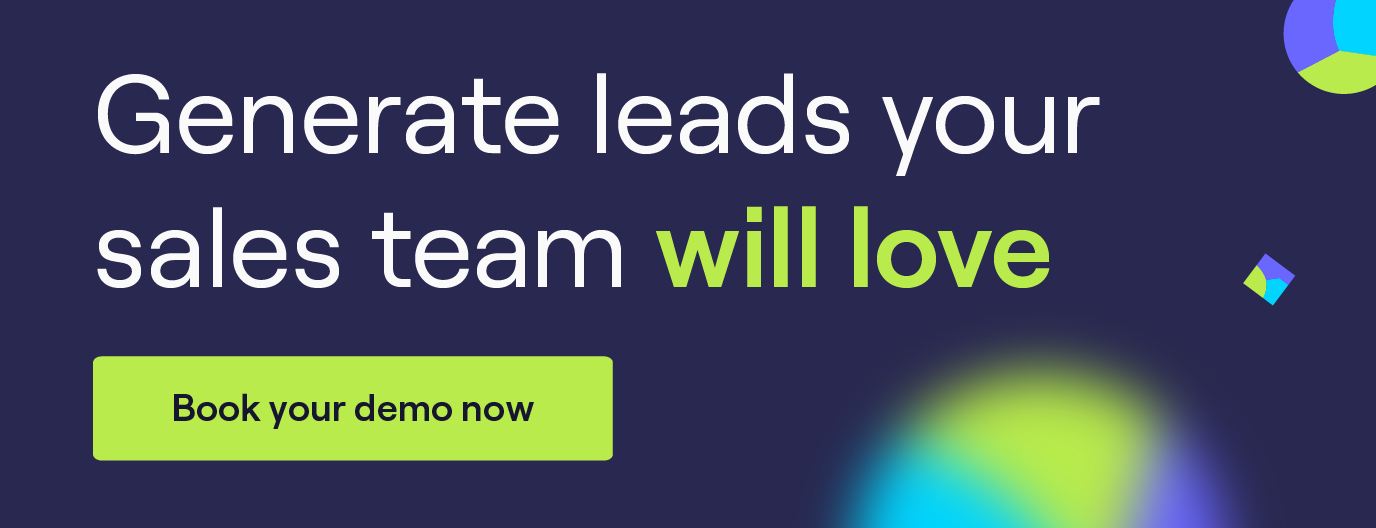
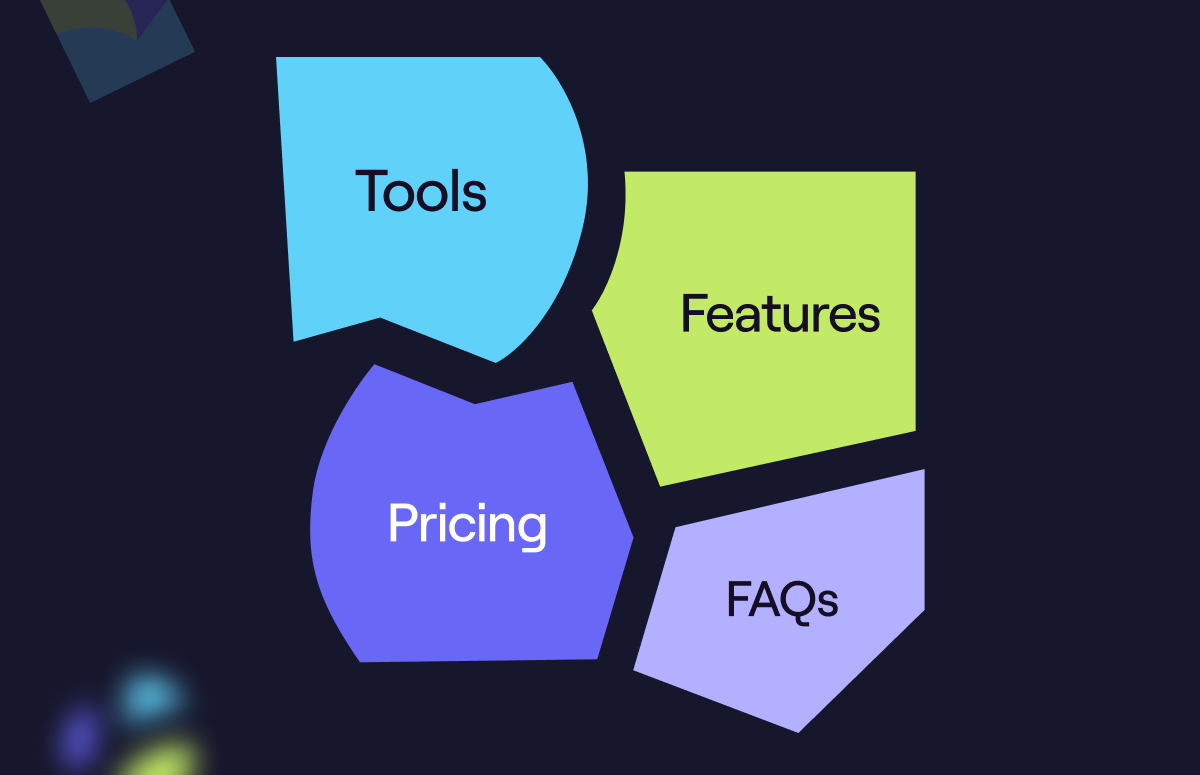
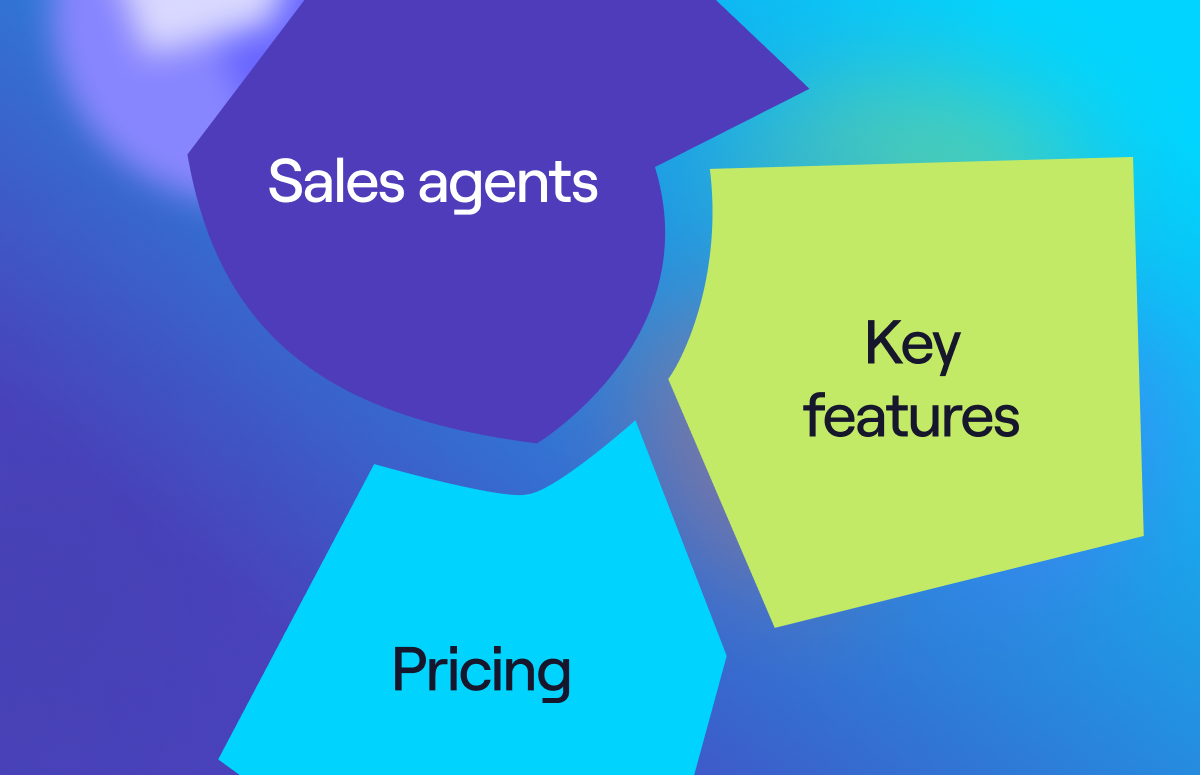
-1.jpg)